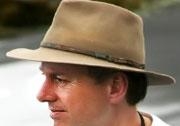Respect the science
UNSW scientists are part of a new national campaign aimed at countering misinformation in science.
UNSW scientists are part of a new national campaign aimed at countering misinformation in science.

A new "Respect the Science" campaign aimed at countering misinformation on science has been launched by Science and Technology Australia, the peak professional body representing 68,000 members across Australia.
"A misinformation campaign being run against the scientific evidence of human made climate change is undermining the nation-building work of all scientists," says S & T Australia at a website just launched to host the campaign.
Three UNSW scientists - Professor James Goff, Professor Brynn Hibbert and Associate Professor Emma Johnston - feature in the site's video presentation, explaining how scientific ideas progress through research and the peer review process to enter the larger body of scientific knowledge.
"The valuable and credible work of all scientists is under attack as a result of a noisy misinformation campaign by climate denialists," S & T Australia says. "It's in the nation's interests that our political leaders now lead the community forward on this critical issue.
"Australians can rely on the scientific evidence to inform decisions because of the rigorous process scientists go through to test and review their research."
The site also carries a message of support from the Prime Minister, Julia Gillard, who says: "This is not a time for ill-informed speculation or scare campaigns masquerading as fact. Now more than ever, we need the objectivity and rationality of science at the heart of our debates. It is the only way we can make well-founded decisions for the long-term future of our nation and our world.
"Moreover, we cannot stand by while the role of science is trashed and our hardworking scientists are abused, even threatened, simply for doing their jobs. By all means let's have civilised and robust debate. But abuse and violent incitement have no place in a community of reason. It's time to 'respect the science'."
The president of the Australian Academy of Science, Professor Suzanne Cory also adds her support, saying: "Every time you drive a car, work at a computer, eat a meal or visit a doctor, your actions are made possible by the work of scientists.
"Science underpins an enormous range of the decisions we make - from the everyday decisions about what to feed a child or whether to take a particular type of medication, to the major national decisions about how to ensure water security, defend the country, improve the economy or tackle climate change.
"Our decisions must be based on proven understanding and scientific evidence, not on misinformation or uninformed assumption."
Media contact: Bob Beale, Faculty of Science media liaison, 0411 705 435.